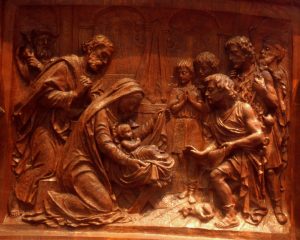Illuminations on the Lectionary readings for Jan. 1, 2023 (The Holy Name)
First Reading: Numbers 6:22-27
In years when January 1 falls on a Sunday, we celebrate the Feast of the Holy Name, recognizing the significance of the Holy Name of Jesus and the emphasis that Luke’s Gospel places on the naming of Jesus.

Adoration of the Christ Child (1877), wood carving at Trinity Church Boston, H.H. Richardson, architect. (Click image to enlarge)
Our first reading finds the Israelites camped at the foot of Mount Sinai, where they have received the Ten Commandments from God through Moses. They are ready to move on toward the Promised Land, but first, God speaks through Moses, uttering a blessing so gracious that it is often used to this day. “The Lord bless you and keep you; the Lord make his face to shine upon you, and be gracious to you; the Lord lift up his countenance upon you, and give you peace.”
Psalm: Psalm 8
“How exalted is the Name of God in all the world!” Psalm 8 is a resounding hymn of praise for God. It expresses our awe at the many glories of God’s creation. The heavens, the moon, the stars in their courses are all the work of God’s hands, the Psalmist sings. The majestic arc of creation is so great that mere humanity seems small in comparison. Yet God has given humanity charge of all the animals, wild and domestic, and all the creatures of the sea. Surely we are called to pursue the same level of careful and loving relationship with this creation as we count on God to provide for us.
Second Reading: Galatians 4:4-7
God sent his own son, born of a woman in full humanity, born under the Torah, to redeem those under Jewish law and tradition, Paul writes in his letter to the people of the church in Galatia in Asia Minor. But that is not the end of the story. Continuing an argument that he pursues throughout Galatians, Paul assures the Gentile members of this young church that they have been adopted as children of God. God sends the Spirit into their heart through Jesus so that they are no longer slaves but children and thus heirs. The way of Jesus is open to all who follow him.
Alternate Second Reading: Philippians 2:5-11
We can hear the gentle rhythm of poetry in these beautiful words that Paul to the Philippians. It is likely that Paul is quoting one of the first hymns of the early church. Its theology is deep, and it remains relevant: Although Jesus was truly God as well as truly human, he chose to “empty himself,” taking on the full weight of his suffering without divine foreknowledge; accepting the pain of crucifixion with human fragility and weakness. In accepting that horrific pain, Jesus showed us the true exaltation of God’s love; and we are called to respond only with love for God and our neighbor.
Gospel: Luke 2:15-21
A week after Christmas, we return to Bethlehem and the manger. In Luke’s version of the Christmas story, shepherds have come down to find Mary and Joseph and the child and tell them the amazing things that they had heard from the angels. Mary “treasured all these words and pondered them in her heart,” Luke says. Then, eight days later, they prepare to take Jesus to be circumcised, one of the most important requirements of Jewish law. As part of this ritual, Mary gives the child the name Jesus, as the Angel Gabriel had instructed her.

